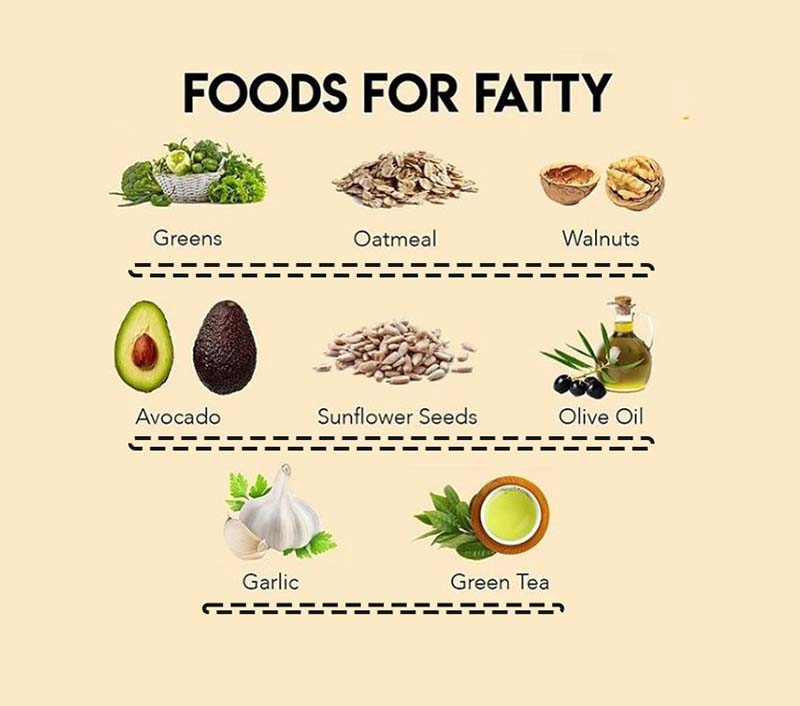Managing iron deficiency anemia is crucial for overall health, and it becomes especially important when considering conditions like fatty liver disease. A balanced diet, rich in key nutrients, plays a pivotal role in supporting liver health and addressing anemia. This guide focuses on the dietary adjustments necessary for those dealing with iron deficiency anemia, particularly emphasizing the importance of a “Fatty Liver Diet” that promotes liver health while boosting red blood cell production.

1. What Is Fatty Liver?
Fatty liver disease happens when there’s too much fat in the liver. Normally, the liver cleanses toxins and produces bile for digestion. But with fatty liver disease, the liver gets damaged and doesn’t work properly.
There are two main types: alcoholic fatty liver and non-alcoholic fatty liver. Alcohol abuse causes the first type, while the second often affects people who are overweight and inactive.
One way to treat fatty liver disease is through diet. A good diet for this condition should include:
- Fruits and Fiber: Eating plenty of fruits rich in fiber, like beans and whole grains, is important. Fiber helps with digestion and keeps blood sugar levels stable, which can lower the risk of fatty liver disease.
- Cut Down on Sugar and Fat: It’s crucial to limit sugar and fatty foods. Too much sugar can make liver fat worse, and a high-fat diet can lead to weight gain, making the condition worse.
- Manage Weight: Keeping a healthy weight is key. Losing extra pounds can reduce strain on the liver and lower the risk of fatty liver disease getting worse.
- Watch Alcohol: For those with alcoholic fatty liver disease, stopping alcohol completely is necessary. Even a little alcohol can harm the liver further.
- Avoid Processed Foods: Stay away from processed foods that are high in unhealthy fats and additives. Choosing fresh, whole foods is a better option.

2. What Foods Are Good for Liver Repair?
Starting with a diet rich in natural, unprocessed foods containing complex carbohydrates, fiber, and protein is a solid foundation. These foods offer lasting energy and promote a feeling of fullness.
Certain diet plans, like the Mediterranean diet, are beneficial for those with NAFLD as they limit processed foods, added sugars, and saturated fats.
Depending on the type of fatty liver disease, a dietitian can tailor a personalized diet plan to suit individual tastes, symptoms, and health status.

Here are some foods that may be particularly beneficial for people with fatty liver disease:
- Garlic: Known for its culinary use, garlic may offer benefits for those with fatty liver disease. Studies suggest garlic supplements positively affect the metabolic profile of individuals with NAFLD.
- Omega-3 Fatty Acids: Research indicates that omega-3 fatty acids found in foods like salmon, sardines, walnuts, and flaxseed may improve liver fat levels, cholesterol, and BMI in NAFLD patients.
- Coffee: Regular coffee consumption is associated with a reduced risk of liver fibrosis development in NAFLD patients. Additionally, some studies suggest coffee may have a beneficial effect on the severity of liver fibrosis.
- Broccoli: Including broccoli in the diet may aid in fat breakdown in the liver. While more human studies are needed, early research in mice with NAFLD shows promising results.
- Green Tea: Rich in antioxidants like catechin, green tea may help alleviate symptoms of fatty liver disease.
- Walnuts: High in omega-3 fatty acids, walnuts could be beneficial for people with fatty liver disease. Some research suggests a reduced risk of NAFLD with nut consumption.
- Soy or Whey Protein: Studies indicate that soy and whey protein may reduce fat buildup in the liver. For example, one study found a 20% decrease in liver fat in obese women consuming 60g of whey protein daily for 4 weeks.
Incorporating these foods into a balanced diet can contribute to better management of fatty liver disease.
3. Foods to Avoid with Fatty Liver
To effectively manage fatty liver disease, it’s crucial to not only incorporate healthy foods into the diet but also to limit or avoid certain other foods that can exacerbate the condition.
- Sugar and Added Sugars: People with fatty liver disease, especially NAFLD, should steer clear of or limit added sugars. These can spike blood sugar levels and contribute to fat accumulation in the liver. Added sugars are commonly found in candy, ice cream, sweetened beverages like soda and fruit drinks, as well as packaged foods, baked goods, and even some store-bought coffee and tea. Avoiding sugars like fructose and corn syrup can also help reduce liver fat.
- Alcohol: Excessive alcohol consumption is a major contributor to fatty liver disease and other liver conditions like cirrhosis. It’s advisable for individuals with fatty liver disease to cut back on alcohol consumption or eliminate it entirely from their diet.
- Refined Grains: Processed and refined grains found in white bread, white pasta, and white rice lack fiber, which can cause blood sugar spikes as the body breaks them down. Consuming fewer refined grains can lower the risk of metabolic syndrome, which is associated with various health issues. Opt for alternatives like potatoes, legumes, whole wheat, or whole grain options.
- Fatty, Fried, or Salty Foods: Overindulging in fatty, fried, or salty foods can increase calorie intake and contribute to obesity, a common precursor to fatty liver disease. Enhance the flavor of meals with spices and herbs instead of salt, and opt for baking or steaming rather than frying foods.
- Meat: Foods high in saturated fats, like beef, pork, and deli meats, can increase fat accumulation around organs, including the liver. It’s advisable to minimize consumption of these meats. Instead, opt for lean meats, fish, tofu, or tempeh. Wild, oily fish is particularly beneficial as it provides omega-3 fatty acids, which are known to support liver health.
Incorporating these dietary changes alongside a balanced, nutrient-rich diet can help manage fatty liver disease more effectively.
4. Lifestyle Changes for Fatty Liver Treatment
Adopting lifestyle modifications is pivotal in effectively reducing and managing symptoms of fatty liver disease. Here are some examples of helpful changes:
4.1 Adjust Calorie Intake
For individuals with NAFLD, focusing on weight loss is paramount. Even a modest reduction in body weight, such as 5%, can significantly decrease the amount of fat accumulated in the liver.
According to the American Gastroenterological Association (AGA), those with NAFLD typically need to consume around 1,200–1,500 calories daily or cut down their daily intake by 500–1000 calories to achieve positive results. The specific calorie requirement varies based on an individual’s body mass.
Since malnutrition is a concern for individuals with Alcoholic Liver Disease (ALD), studies suggest that the optimal caloric intake for these individuals should be around 2,000 calories per day, incorporating approximately 1.2 to 1.5 grams of protein per kilogram of body weight.
Eating smaller, more frequent meals with shorter intervals between them can aid in better food absorption and nutrient utilization.

4.2 Physical Activity
Regular exercise is beneficial for overall health, with added advantages for individuals dealing with fatty liver disease in terms of symptom management.
The AGA recommends at least 150–300 minutes of moderate aerobic exercise or 75–150 minutes of vigorous exercise per week for individuals with NAFLD.

Note: Alongside dietary changes and exercise, prioritizing adequate hydration, reducing alcohol consumption, and getting sufficient sleep are additional lifestyle factors that can positively impact liver health. It’s crucial to consult with a healthcare professional or a registered dietitian to develop a personalized treatment plan tailored to individual needs and health conditions.
5. Frequently Asked Questions
5.1 What foods can help remedy fatty liver?
Research suggests that people with fatty liver disease may benefit from consuming the following foods:
- Spinach and other leafy greens
- Fish rich in omega-3 fatty acids such as salmon, sardines, tuna, and trout
- High fiber foods like oats
- Walnuts
- Turmeric and curcumin
- Sources of vitamin E such as sunflower seeds
- Garlic
5.2 What is the fastest way to reduce fatty liver?
Improving a fatty liver won’t happen overnight. However, reducing alcohol consumption, adopting a diet rich in plant-based whole foods, and maintaining a healthy weight can help you see results over time.
5.3 What foods should a person with fatty liver limit or avoid?
Your healthcare professional may recommend cutting back on less nutritious foods and beverages known to contribute to weight gain and increased blood sugar levels. These often include:
- Beer, wine, liquor, and other alcoholic beverages
- Foods high in added sugars like candy, sodas, and fruit juices
- Fried or highly processed foods made from white flour such as bread, rice, and pasta
- Red meat, particularly beef and pork, and other sources of added sodium
In many cases, practicing moderation rather than complete elimination can help create sustainable dietary changes.
6. Conclusion
In conclusion, adopting a healthy Fatty Liver Diet can play a crucial role in managing and improving fatty liver disease. By incorporating nutrient-rich foods, limiting certain items, and maintaining a balanced lifestyle, individuals can take proactive steps towards better liver health. We encourage you to share your own experiences and feedback with us. Additionally, explore more informative blogs on Fatty Liver Diet and other related topics on Biosculpture’s website. Your journey to a healthier liver starts now.


